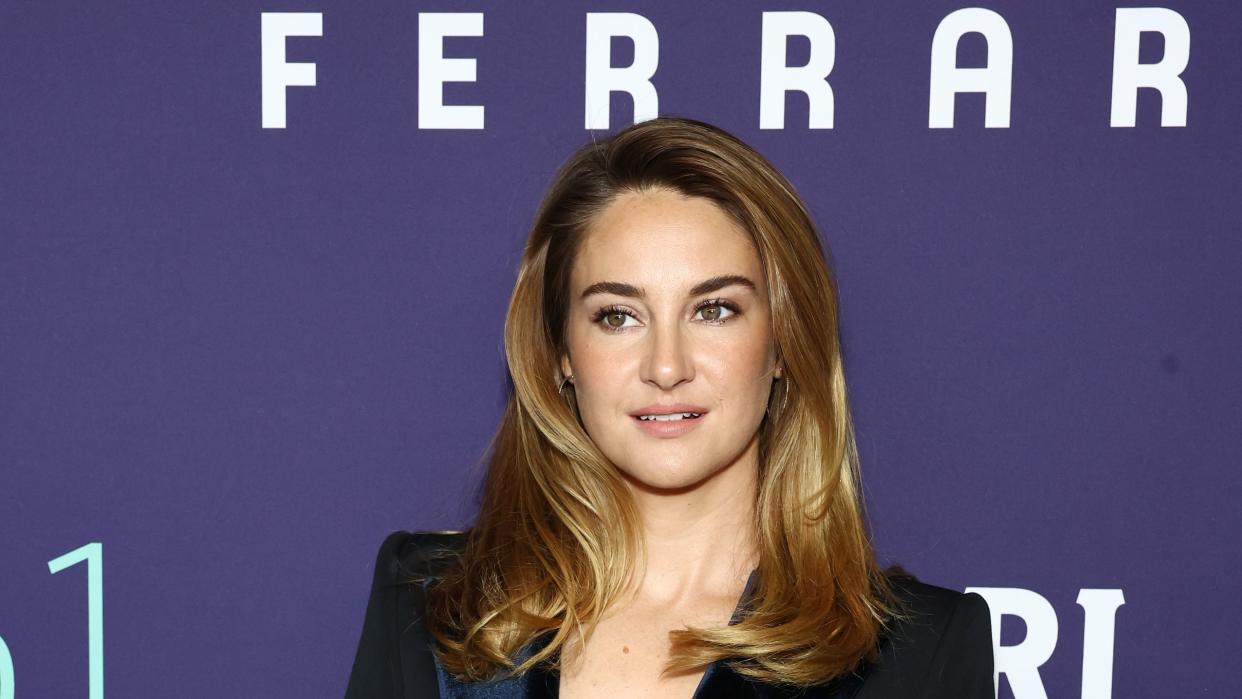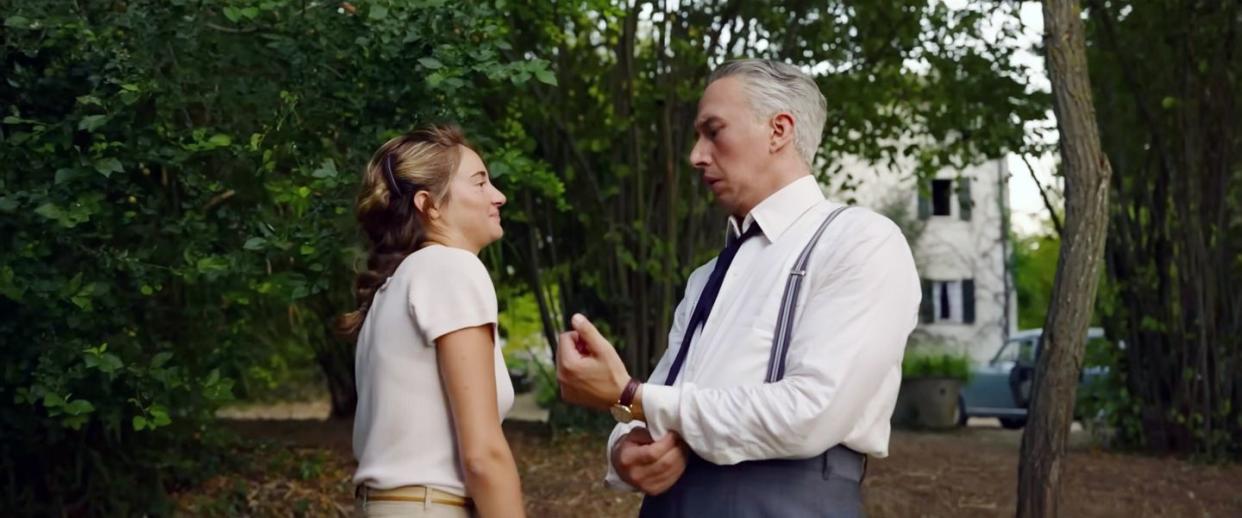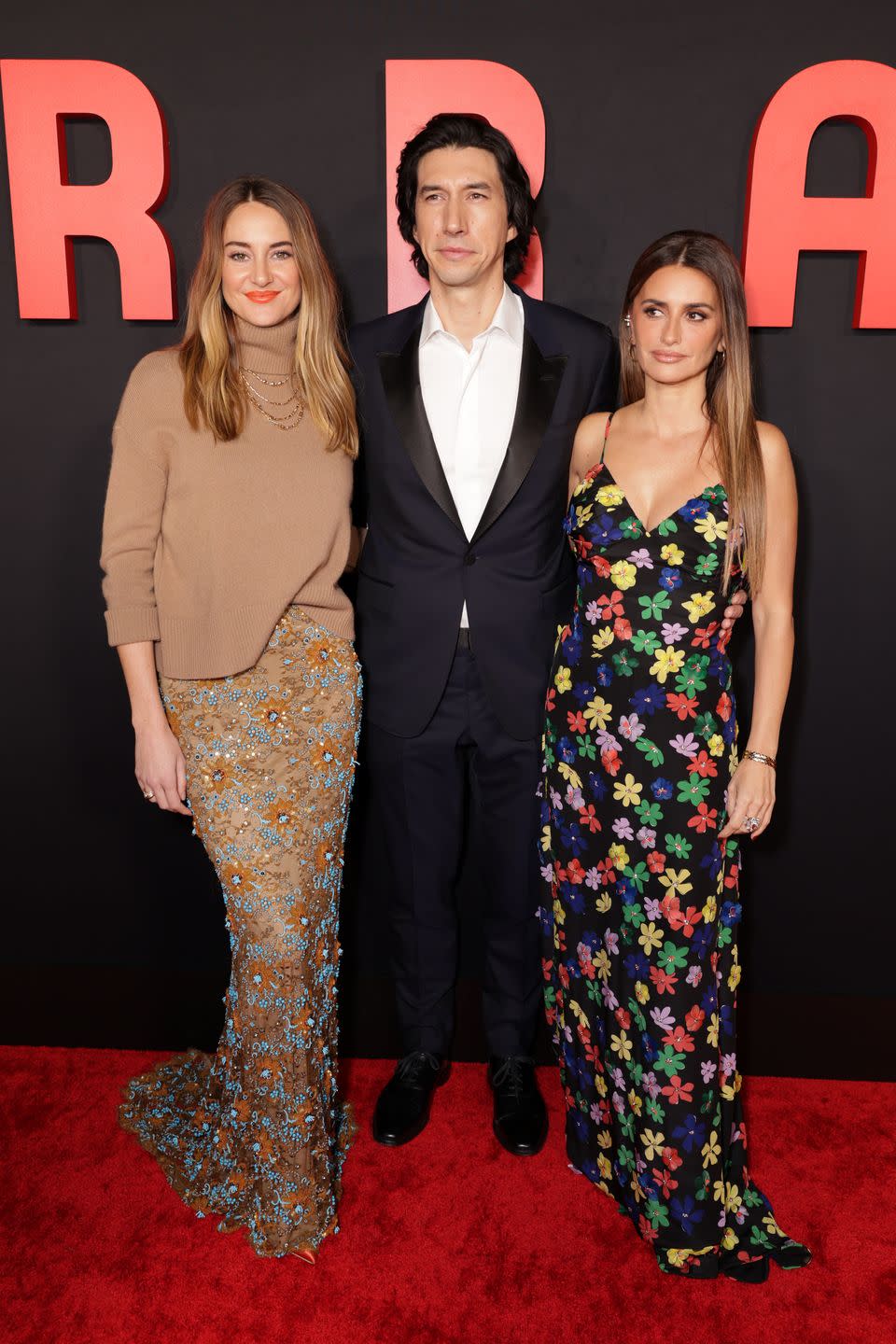Shailene Woodley Shows a New Side of Being the Other Woman in “Ferrari”

After nearly 25 years of working as an actor, Shailene Woodley has developed a simple litmus test when looking for her next project: “I’ll read a script, or I’ll hear about a project that has someone involved, and I either get butterflies or I don’t—and that’s the marker.
“So much of it really is spontaneous and intuitive, and I kind of always liken it to falling in love,” the Emmy- and Golden Globe–nominated star of Big Little Lies, The Descendants, and The Fault in Our Stars tells Harper’s Bazaar. “You never really know when it’s going to happen. When the magic strikes, you have the option to go with it and lean into it and see what occurs, and that’s how filmmaking is for me.”
Magic struck when Woodley was offered a role in Ferrari, a sports drama film that director Michael Mann has been attempting to make for as long as Woodley has been acting professionally. Helmed by Mann and written by the late Troy Kennedy Martin, the unconventional biopic, which comes out December 25 in theaters, chronicles the personal and professional struggles of Italian motor racing entrepreneur Enzo Ferrari (played by Adam Driver) during the summer of 1957. Penélope Cruz stars as Laura Ferrari, Enzo’s wife and business partner, who has been grieving the recent tragic death of their son, Dino, while Woodley plays Lina Lardi, Enzo’s mistress, with whom he shares a 12-year-old son, Piero. (Piero Ferrari is now vice chairman of his father’s automotive company.)
Woodley remembers getting the butterflies during a Zoom meeting with Mann a couple of years ago, when she was quarantining in Montreal for another job, on a particularly brutal winter day. “The way that he spoke about my character specifically with so much depth, interest, and curiosity, and a deep desire to bring out as much honest expression as possible from her, was something that’s just rare to hear from a director,” she says. “In all honesty, I feel like the art of directing is kind of ambiguous at the moment; there’s so many different ways to direct. So to work with someone who has studied the craft of being the conductor of a massive orchestra for his entire life, who cares so deeply and has such an astute attention to detail in every single aspect of the filmmaking process and even the publicity and marketing of it, it felt like a rare gift, like a treasure that you just don’t find anymore.”
On a recent video call from Los Angeles, Woodley reflected on her approach to playing one of the great loves of Enzo Ferrari’s life, the ongoing evolution of her career, and what she is most looking forward to exploring in a third season of Big Little Lies, which is reportedly in the works.
There’s something very universal and comforting about sharing stories over food, and you had an opportunity to cook pasta with Italian women who knew your character, Lina Lardi, personally. Given that there isn’t a lot of public information about her, what insights were you able to glean from your conversations with those women and her son, Piero Ferrari, about Lina and her relationships with Enzo and Piero?
I spoke with Lina’s niece, I spoke with Piero Ferrari, and I spoke with a friend of hers who was a chef—and she was the one that I made pasta with. Every single person provided the same testimony of Lina, which was that early on, this woman made a choice that she was going to stand by her lover and stand up for her son at all costs. She was going to do it unconditionally … but deliver it in a way that was inclusive, welcoming, and inviting, and not harsh [or] divisive.
Hearing that from each person who knew her from a different aspect of her life and had a different dynamic with her, I don’t know that I’ve ever met anyone like her. I’m not like that. [Laughs.] I could try to be a little bit more [like that] in my life, but she really did seem to represent an idea of unconditional love that is rare to find. When we think about unconditional love, oftentimes being a pushover or being someone who doesn’t have a strong identity can be associated with being in service to others. But the way people described her, she was not a people pleaser. She was not someone who was acting from an insecure and unstable place of needing validation. She was someone who was very empowered and knew exactly who she was, and was in full acceptance of the reality of her circumstances.
The biggest gift Piero Ferrari gave me in understanding his relationship with his mom was when we first sat down together and I asked him about her. He took a deep breath and didn’t find words immediately, and there was a moment of unstable breathing. There was a deep well of emotion that surfaced for him. And to see a man in his late 70s, who has had the life that he has had, have this type of emotional representation for his mother allowed me to understand the true depth of the connection and the love that she had for her son.

One of the hallmarks of Michael Mann’s films about discontented men is the acknowledgment of the impact various women have had on their lives. What do you think can be revealed in the interactions that Enzo had with the women in his life? How would you compare and contrast Enzo’s relationships with Lina and his wife, Laura?
I think human beings are messy and complicated, and sometimes you meet someone and you can’t explain why there’s chemistry, but there is. It doesn’t necessarily mean there’s healthy emotional communication or there’s a healthy mental volley that can occur. Other times, we connect with people, and there’s an immediate safety and an immediate comfort [with them], and it’s unexplainable. Maybe it’s messy in the fact that it’s not something that can be an everyday occurrence or a consistent theme in their lives. What I think Michael did so beautifully in this film was depict that we are never just one thing. Emotions are constantly changing, and the only truth in life is that everything changes. Michael was able to show us that, via the relationships between Enzo and Laura and Enzo and Lina.
Lina was grieving the fact that she wasn’t going to have a traditional, familial, consistent unit the way that one did in 1950s Italy, with marriage, children, and that idealistic dream. Laura was grieving the fact that she lost her son, which is the worst thing anyone can go through, and the fact that she lost her husband and the love that they shared through that process. So you see two women dealing with grief in very different ways, and the way that they approach that emotion, and the way that they have different tools within themselves to cope with whatever circumstances they’re surrounded with. Enzo just happens to be the person who is in the center of that conflict, and when you see his struggle with Laura, what’s juxtaposed is his [relaxedness] and his softness with Lina.
Over the course of the film, Lina is pushing Enzo a little bit over time to acknowledge Piero publicly as his son, until that conversation comes to a head during a particularly heated argument—argument is maybe too strong of a word; maybe discussion is more fitting—in Lina’s room. What did you want to convey in that sequence, and what are some of your biggest takeaways from working with Adam Driver?
I loved working with Adam. I think Adam and I work very similarly. At the end of the day, I actually think acting is quite a simple craft. We’re just professional listeners. That’s all we do. And when you really listen, it’s impossible not to have a reaction—whether it’s a subtle reaction, a verbal reaction, an emotional reaction—because that’s just the way that energy works. It was just so much fun, to be honest, to work with Adam because he’s so present and such a fantastic listener, so I felt like we were able to give and receive within the dynamics of who these people were and what their life looked like.
A lot of the conversations Michael and I had leading up to the beginning of filming, as well as every day throughout the process, was that we needed Lina to be firm in who she was, specifically in scenes like that, where it could come off as argumentative. She had to be firm in her viewpoint, but she had to be soft in her delivery, without being a pushover and without losing her sense of direction and her North Star. All of those things were the pillars of who Lina was. With Adam and Michael, we could show conflict without animosity, without division. Anger existed, but the anger wasn’t presented in a divisive way; it was presented in an inclusive way. That was something that was really exciting, and something I’d never been able to really do before with a character.
You once said that, when crafting the character, Michael asked you questions that no director has ever asked you before.
One of the first things he asked was, “So when she gets out of bed in the morning, do you think she has slippers next to the bed or no slippers?” And I was like, “That’s a great question. I haven’t thought about that yet.” And he’s like, “Okay, well, she doesn’t have slippers. What temperature do you think the stone beneath her feet would be? What do you think she would feel, temperature-wise, on her skin when she took the sheets off of her first thing in the morning?” I remember at the time thinking, How is this going to help me understand the emotional well-being and the emotional crisis or conflict within this person’s body and mind? [Laughs.] But the wonderful thing about Michael is that it does.
Would there be cobwebs in the corner of her house, or is she a meticulous person? Does she have help around the house to clean things and cook things, or is she doing it all on her own? What are the ways in which she finds release for her stress? Is it through knitting? Is it through reading? Is it through listening to the radio? Does she dance when she’s alone and no one’s watching? Or does she talk to herself out loud? Is that one of her ways of processing things when Piero is at school and Enzo’s at work? Is she just talking through the hallways to understand herself and life a little bit more?
All of those things helped me decide who this person was and what the outlets were for her emotional well-being, because so much of her life was emotionally compartmentalized so that she could show up for others. We needed to find those pinpoints that nobody in the audience will ever see in the film, but I think helped inform how she was able to remain a steadfast person despite whatever storms were around her.

Your roles in recent years have represented a noticeable transition to playing fully grown-up characters—mothers, lovers, career-oriented women with rich inner lives. How do you think you’ve evolved as an actor since you first started out, and how would you define this era of your career?
Well, I’m not five anymore, and I’m not 18, so I can’t do the young-adult shit anymore. [Laughs.] I think acting is a mirror to life. The way that I look at it has never been [that] I’m playing a character or I’m playing something that’s outside of myself. Whether that’s right or wrong, I don’t know. But for me, it’s always felt like I’m exploring a different dimension and layer of who I am, because I think we are all things all the time, and it’s just about what we allow ourselves, depending on our value system and our moral compass, to explore. So I do think that acting is the greatest exercise in giving myself permission to be anything at any given time.
At this point in my life, the characters that I relate to are going through things that I have been through myself, or going through things that dear friends of mine have, or my mother has, or women that I know who are in the later halves of their lives. You never quite know when the magic is going to strike, but magic strikes when we’re ready for something. So I feel like at this point in my career, what I’m ready for is to understand and explore different emotional expressions that I wasn’t equipped for in my 20s, or in my teens, or in my preteens, or as a child, because it was beyond the comprehension of what I could relate to.
Nicole Kidman seemed to confirm recently that a third season of Big Little Lies is in the works. Have you heard from her and Reese Witherspoon about getting the band back together and returning to that world yet? What would you be most excited to explore about the next chapter of [your character] Jane’s story?
It’s been a dream for us [to do a third season]. Working together on that show was so many things, and the way that it affected so many people around the world and the way that it affected us—that was something none of us expected. I think what excites me about the possibility of a third season, more than what I could think of with Jane, is the fact that these children [on the show] are not children anymore. They’re teenagers now! Jean-Marc Vallée, our brilliant filmmaker who brought Big Little Lies together and really made it what it was, sadly passed away, and at his funeral last year, all of the kids came and the cast was there. So I’m looking around and I’m like, “Where’s our kids?!” Their voices have dropped, they all have their teenage situation happening [waves hands over face to imply acne], and the angst is kicking in, and that, to me, is what is exciting about the possibility of a third season. What does life look like for those people who are not children anymore?
This interview has been edited and condensed for length and clarity.
You Might Also Like
